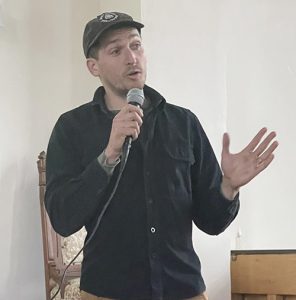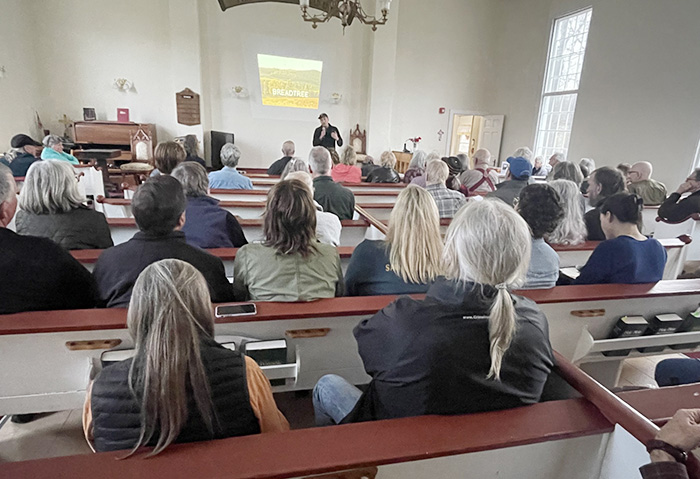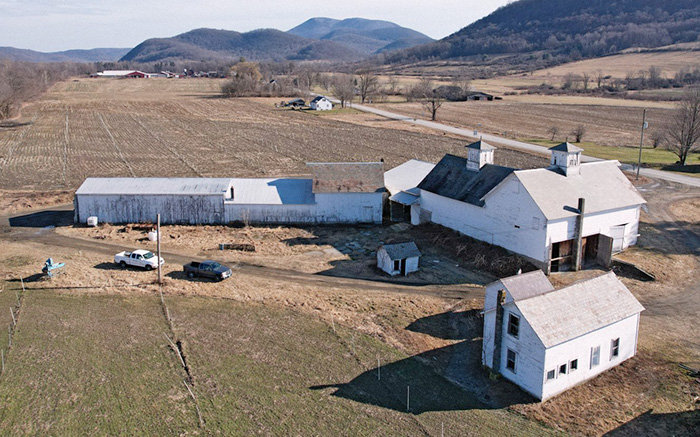By Cathy DeDe, Chronicle Managing Editor
Russell Wallack has a mission — “to build the organic chestnut industry to a watershed scale in the Northeast.”

The chestnut trees are already being grown in Greenwich and Granville.
Breadtree said it must provide $819,800 toward the project. Mr. Wallack tells The Chronicle that Breadtree is funded in part by $2 million from private investors, which helped purchase its properties in Washington County.
The grant is to research, design and build a specialized facility to process, handle, store and distribute chestnuts as food. It will also provide marketing outreach, and consumer sales and education, said grant materials.
More than 60 people attended Mr. Wallack’s talk about the project on Friday, April 12, at Hebron United Church East. He introduced a half-dozen Breadtree staff who live locally and work the farms.

The trees can yield 1,500-3,500 pounds per acre of a “nutrient-dense, gluten-free perennial starch crop,” he writes on the Breadtree Website.
He and his team believe chestnuts can succeed as a new food source, “given growing consumer interest in grain alternatives, gluten-free ingredients and local or sustainable foods.”
He said Americans consume far fewer chestnut products than other countries, particularly China and Korea.
“But almost 100 percent of what we do consume comes from other countries, so right away there’s a built in market for locally sourced,” he said.
“Chestnuts are a historically important, high value food source…more than wheat, going back to ancient times,” he said.
In the U.S., he said, they all but disappeared as an edible after the chestnut blight of the early 1900s.
The new trees they’re planting are disease resistant hybrids, Mr. Wallack said.
Their plan is called “agroforestry,” combining food-producing trees with grazing land. The plastic tubes protect the trees from farm animals and deer.
“Replacing annual food production with perennial staple tree crops is one of the most effective strategies to counteract climate change,” Mr. Wallack said.

In Granville, they have a 120-acre site along the New York-Vermont border, with about 70 acres of former hay and corn fields converted to chestnut, hickory, and apple mixed-use grazing orchards.
“Those trees will be 18 feet tall before long, and will start to look more like an orchard in the next four years,” Mr. Wallack said.
He warned the effort is still in the experimental phase.“I was doing other things to try and make chestnut agriculture happen in the U.S.,” Mr. Wallack said. “I wasn’t satisfied with that working, so I said I’m going to start a farm and show them that this is an economically viable way to work with the land.”
“It’s a part of our theory of change that we have to show that this actually works as a business,” he said, adding, “I also don’t want to be excessively preaching. This is not easy. There’s no guarantee.
“Don’t jump in unless you’re really excited to be learning as you go. But we think there’s a lot of potential here.”
Their first planting was in 2019 in Johnsonville, near Schaghticoke, Rensselaer County.
“The first way we were able to get trees in the ground” was appealing to farmers, Mr. Wallack said. He says he told them, “I know this isn’t much of an offer. But if I plant these trees and I make it work, and you get a percentage cut of every chestnut I ever sell, you can make more money over 30 years than you can make with the lease you have today on your land.”
Copyright © 2024 Lone Oak Publishing Co., Inc. All Rights Reserved
 Glens Falls Chronicle Serving the Glens Falls/Lake George region; Warren, Washington and northern Saratoga counties since 1980
Glens Falls Chronicle Serving the Glens Falls/Lake George region; Warren, Washington and northern Saratoga counties since 1980

